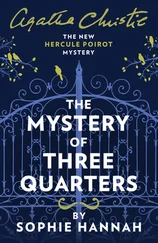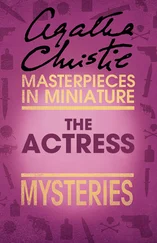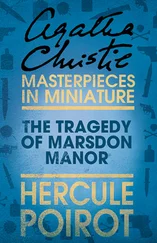Agatha Christie - Three Act Tragedy
Здесь есть возможность читать онлайн «Agatha Christie - Three Act Tragedy» весь текст электронной книги совершенно бесплатно (целиком полную версию без сокращений). В некоторых случаях можно слушать аудио, скачать через торрент в формате fb2 и присутствует краткое содержание. Жанр: Классический детектив, на английском языке. Описание произведения, (предисловие) а так же отзывы посетителей доступны на портале библиотеки ЛибКат.
- Название:Three Act Tragedy
- Автор:
- Жанр:
- Год:неизвестен
- ISBN:нет данных
- Рейтинг книги:4.5 / 5. Голосов: 2
-
Избранное:Добавить в избранное
- Отзывы:
-
Ваша оценка:
- 100
- 1
- 2
- 3
- 4
- 5
Three Act Tragedy: краткое содержание, описание и аннотация
Предлагаем к чтению аннотацию, описание, краткое содержание или предисловие (зависит от того, что написал сам автор книги «Three Act Tragedy»). Если вы не нашли необходимую информацию о книге — напишите в комментариях, мы постараемся отыскать её.
Three Act Tragedy — читать онлайн бесплатно полную книгу (весь текст) целиком
Ниже представлен текст книги, разбитый по страницам. Система сохранения места последней прочитанной страницы, позволяет с удобством читать онлайн бесплатно книгу «Three Act Tragedy», без необходимости каждый раз заново искать на чём Вы остановились. Поставьте закладку, и сможете в любой момент перейти на страницу, на которой закончили чтение.
Интервал:
Закладка:
“We must now examine the part played by Miss Wills in the drama. Miss Wills has a curious personality. She is one of those people who are quite unable to impress themselves on their surroundings. She is neither good-looking nor witty nor clever, nor even particularly sympathetic. She is nondescript. But she is extremely observant and extremely intelligent. She takes her revenge on the world with her pen. She had the great art of being able to reproduce character on paper. I do not know if there was anything about the butler that struck Miss Wills as unusual, but I do think that she was the only person at the table who noticed him at all. On the morning after the murder her insatiable curiosity led her to poke and pry, as the housemaid put it. She went into Dacres’s room, she went through the baize door into the servants’ quarters, led, I think, by the mongoose instinct for finding out.
“She was the only person who occasioned Sir Charles any uneasiness. That is why he was anxious to be the one to tackle her. He was fairly reassured by his interview and distinctly gratified that she had noticed the birthmark. But after that came catastrophe. I don’t think that until that minute Miss Wills had connected Ellis the butler with Sir Charles Cartwright. I think she had only been vaguely struck by some resemblance to someone in Ellis. But she was an observer. When dishes were handed to her she had automatically noted – not the face – but the hands that held the dishes.
“It did not occur to her that Ellis was Sir Charles . But when Sir Charles was talking to her it did suddenly occur to her that Sir Charles was Ellis ! And so she asked him to pretend to hand her a dish of vegetables. But it was not whether the birthmark was on the right or the left wrist that interested her.
She wanted a pretext to study his hands – hands held in the same position as those of Ellis the butler.
“And so she leaped to the truth. But she was a peculiar woman. She enjoyed knowledge for its own sake. Besides, she was by no means sure that Sir Charles had murdered his friend. He had masqueraded as a butler, yes – but that did not necessarily make him a murderer. Many an innocent man has kept silence because speech would place him in an awkward position.
“So Miss Wills kept her knowledge to herself – and enjoyed it. But Sir Charles was worried. He did not like that expression of satisfied malice on her face that he saw as he left the room. She knew something. What? Did it affect him? He could not be sure. But he felt that it was something connected with Ellis the butler. First Mr. Satterthwaite – now Miss Wills. Attention must be drawn away from that vital point. It must be focused definitely elsewhere. And he thought of a plan – simple, audacious and, as he fancied, definitely mystifying.
“On the day of my Sherry Party I imagine Sir Charles rose very early, went to Yorkshire and, disguised in shabby clothes, gave the telegram to a small boy to send off. Then he returned to town in time to act the part I had indicated in my little drama. He did one more thing. He posted a box of chocolates to a woman he had never seen and of whom he knew nothing…
“You know what happened that evening. From Sir Charles’s uneasiness I was fairly sure that Miss Wills had certain suspicions. When Sir Charles did his ‘death scene’ I watched Miss Wills’s face. I saw the look of astonishment that showed on it. I knew then that Miss Wills definitely suspected Sir Charles of being the murderer. When he appeared to die poisoned like the other two she thought her deductions must be wrong.
“But if Miss Wills suspected Sir Charles, then Miss Wills was in serious danger. A man who has killed twice will kill again. I uttered a very solemn warning. Later that night I communicated with Miss Wills by telephone, and on my advice she left home suddenly the next day. Since then she had been living here in this hotel. That I was wise is proved by the fact that Sir Charles went out to Tooting on the following evening after he had returned from Gilling. He was too late. The bird had flown.
“In the meantime, from his point of view, the plan had worked well. Mrs. de Rushbridger had something of importance to tell us. Mrs. de Rushbridger was killed before she could speak. How dramatic! How like the detective stories, the plays, the films! Again the cardboard and the tinsel and the painted cloth.
“But I, Hercule Poirot, was not deceived. Mr. Satterthwaite said to me she was killed in order that she should not speak. I agreed. He went on to say she was killed before she could tell us what she knew. I said, ‘ Or what she did NOT know .’ I think he was puzzled. But he should have seen then the truth. Mrs. de Rushbridger was killed because she could, in actual fact, have told us nothing at all . Because she had no connection with the crime. If she were to be Sir Charles’s successful red herring – she could only be so dead . And so Mrs. de Rushbridger, a harmless stranger, was murdered…
“Yet even in that seeming triumph Sir Charles made a colossal – a childish – error! The telegram was addressed to me, Hercule Poirot, at the Ritz Hotel. But Mrs. de Rushbridger had never heard of my connection with the case! No one up in that part of the world knew of it. It was an unbelievably childish error.
“ Eh bien , then I had reached a certain stage. I knew the identity of the murderer. But I did not know the motive for the original crime.
“I reflected.
“And once again, more clearly than ever, I saw the death of Sir Bartholomew Strange as the original and purposeful murder. What reason could Sir Charles Cartwright have for the murder of his friend? Could I imagine a motive? I thought I could.”
There was a deep sigh. Sir Charles Cartwright rose slowly to his feet and strolled to the fireplace. He stood there, his hand on his hip, looking down at Poirot. His attitude (Mr. Satterthwaite could have told you) was that of Lord Eaglemount as he looks scornfully at the rascally solicitor who has succeeded in fastening an accusation of fraud upon him. He radiated nobility and disgust. He was the aristocrat looking down at the ignoble canaille.
“You have an extraordinary imagination, M. Poirot, he said. It’s hardly worth while saying that there’s not one single word of truth in your story. How you have the damned impertinence to dish up such an absurd fandangle of lies I don’t know. But go on, I am interested. What was my motive for murdering a man whom I had known ever since boyhood?”
Hercule Poirot, the little bourgeois, looked up at the aristocrat. He spoke quickly but firmly.
“Sir Charles, we have a proverb that says, ‘ Cherchez la femme .’ It was there that I found my motive. I had seen you with Mademoiselle Lytton Gore. It was clear that you loved her – loved her with that terrible absorbing passion that comes to a middle-aged man and which is usually inspired by an innocent girl.
“You loved her. She, I could see, had the hero worship for you. You had only to speak and she would fall into your arms. But you did not speak. Why?
“You pretended to your friend, Mr. Satterthwaite, that you were the dense lover who cannot recognise his mistress’s answering passion. You pretended to think that Miss Lytton Gore was in love with Oliver Manders. But I say, Sir Charles, that you are a man of the world. You are a man with a great experience of women. You cannot have been deceived . You knew perfectly well that Miss Lytton Gore cared for you. Why, then, did you not marry her? You wanted to do so.
“It must be that there was some obstacle. What could that obstacle be? It could only be the fact that you already had a wife. But nobody ever spoke of you as a married man. You passed always as a bachelor. The marriage, then, had taken place when you were very young – before you became known as a rising young actor.
Читать дальшеИнтервал:
Закладка:
Похожие книги на «Three Act Tragedy»
Представляем Вашему вниманию похожие книги на «Three Act Tragedy» списком для выбора. Мы отобрали схожую по названию и смыслу литературу в надежде предоставить читателям больше вариантов отыскать новые, интересные, ещё непрочитанные произведения.
Обсуждение, отзывы о книге «Three Act Tragedy» и просто собственные мнения читателей. Оставьте ваши комментарии, напишите, что Вы думаете о произведении, его смысле или главных героях. Укажите что конкретно понравилось, а что нет, и почему Вы так считаете.












